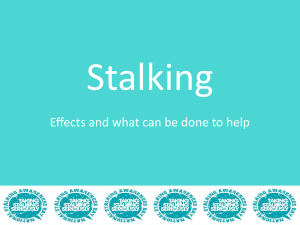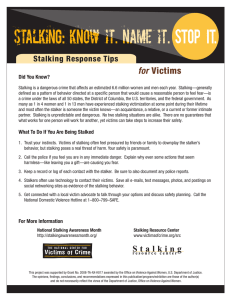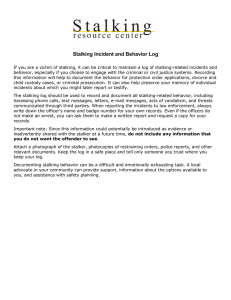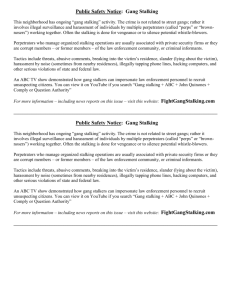Calhoun Community College STALKING & BULLYING POLICY
advertisement
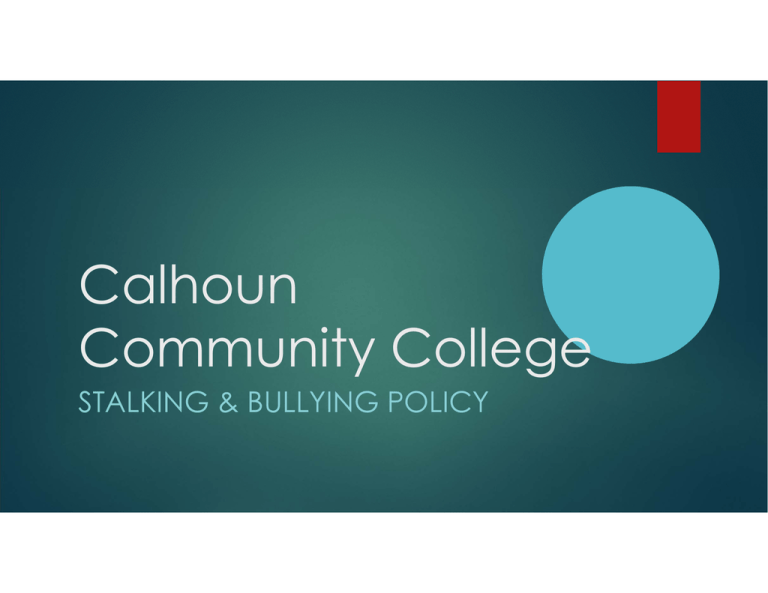
Calhoun Community College STALKING & BULLYING POLICY Purpose statement Calhoun Community College has the responsibility to provide a campus atmosphere free of violence for all members of the campus community. For this reason, the College does not tolerate stalking, or bullying, and will pursue the perpetrators of such acts to the fullest extent possible. Calhoun is also committed to supporting victims of stalking and bullying through the appropriate provision of safety and support services. Policy Statement Calhoun Community College is committed to providing a safe and comfortable learning environment; a friendly and relaxing campus atmosphere that allows individuals to fully maximize their educational potential. Therefore, the College prohibits the use of intimidating, abusive, and disrespectful behavior that is directed at stalking and/or bullying other students, faculty, staff, or administrators with the intent of victimizing that individual. Individuals who feel they have been the victim of such activities are encouraged to report the incident to the Office of Student Affairs or Campus Police. Individuals who report such activities need not fear reprisal, Individuals who fail to report such activities may be held accountable. Definition of Stalking Definition of Stalking Stalking is a course of conduct directed at a specific person that would cause a reasonable person to feel fear. A “course of conduct” can be defined as a pattern of behavior composed of two or more acts over a period of time, however short, that evidence a continuity of purpose. A “reasonable person” standard asks if a reasonable person in similar circumstances would be made afraid by the perpetrator’s behavior. Definition of Bullying Bullying is defined as behavior directed at another individual that is meant to hurt them either physically or emotionally in an effort to elicit a reaction to pain, hurt feelings, fear, segregation, or humiliation caused by one attempting to wield power and/or control over them. Policy Jurisdiction This protocol applies equally to all full and part-time students, full and part-time staff, faculty, administrators, contract employees, and any campus visitors, at all College sponsored activities whether on or off campus. Stalking Behaviors Non-consensual communication including in-person communication, telephone calls, voice messages, text messages, email messages, social networking site postings, instant messages, postings of pictures or information on Web sites, written letters, gifts, or any other communications that are undesired and/or place another person in fear Following, pursuing, waiting, or showing up uninvited at a workplace, place of residence, classroom, or other locations frequented by a victim Surveillance and other types of observation, whether by physical proximity or electronic means Trespassing Vandalism Stalking Behaviors Non-consensual touching Direct physical and/or verbal threats against a victim or a victim’s loved ones Gathering of information about a victim from family, friends, co-workers, and/or classmates Manipulative and controlling behaviors such as threats to harm oneself, or threats to harm someone close to the victim Defamation or slander against the victim Bullying Behaviors Physical bodily harm Verbal bully undermines, demeans, threatens Social bully segregates and humiliates Cyberbully uses networking tools, often anonymously to debase Bodily Harm Damage to property Mocking Shunning Staring/Glaring Fabricating/Spreading rumors Bullying Statistics Bullying on college campuses is rising: 15% of college students report being bullied 25% of college students report being cyber-bullied 42% of college students report having seen another student being bullied Reporting Procedures The College Administration encourages the reporting of all incidents of stalking or bullying to law enforcement authorities, and respects that whether or not to report to the police is a decision that the victim needs to make. The Campus Police Office or the Student Affairs Office are available to inform victims of the reporting procedures and offer appropriate referrals. Victims of stalking or bullying choosing to pursue the reporting process have the right to assistance or consultation of an advocate in accordance with state law. The College offers services to victims even if they choose not to report the incidents. The Student Affairs Office provides services, advocates, and information for victims in a safe, supportive, and confidential setting. Reporting Procedures In some circumstances, a victim may wish to seek an order of protection from a court of appropriate jurisdiction against the alleged perpetrator. Victims may also seek restriction of access to the campus by non-students or non-employees in certain circumstances. Stalking Victims’ Rights Students on our campus have the right to live free of behaviors that interfere with students attaining their educational goals. Students who report stalking have the right to: Treatment with dignity and respect, not subjected to biased attitudes or judgments Not having past and irrelevant conduct discussed during any resulting proceedings Changes in academic and/or living situations, if possible All support services regardless of the choice to file a school or criminal complaint Submission of a written account of the incident and a victim-impact statement Having a person of choice, including legal counsel or an advocate, present throughout the proceedings, as set forth in the student code of conduct Having one’s identity protected, in accordance with the student code of conduct or other legal requirements Stalking Victims’ Rights Victims can request immediate on-campus housing relocation, transfer of classes, or other steps to prevent unnecessary or unwanted contact or proximity to an alleged assailant. When possible, requests will be accommodated. For assistance obtaining these safety accommodations, please contact The Office of Student Affairs – Dr. Kermit Carter. If safety is an immediate concern, victims are encourage to contact law enforcement or for assistance. Rights of Accused Students accused of stalking behaviors have rights on this campus. Those include : The right to know the nature and source of the evidence used in the hearing process The right to present witnesses and material evidence relevant to the case The right to an advocate or attorney to aid in the preparation and presentation of the case Access to services from the counseling, health center or other student service group Voluntary residence hall relocation, when available Consultation with a campus official on academic support services and referrals to community resources when appropriate.
